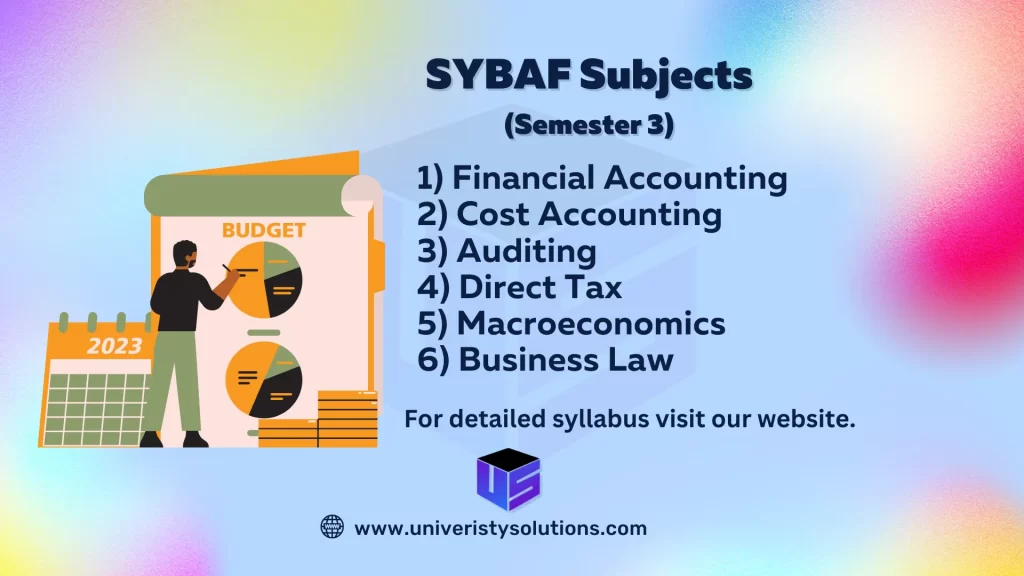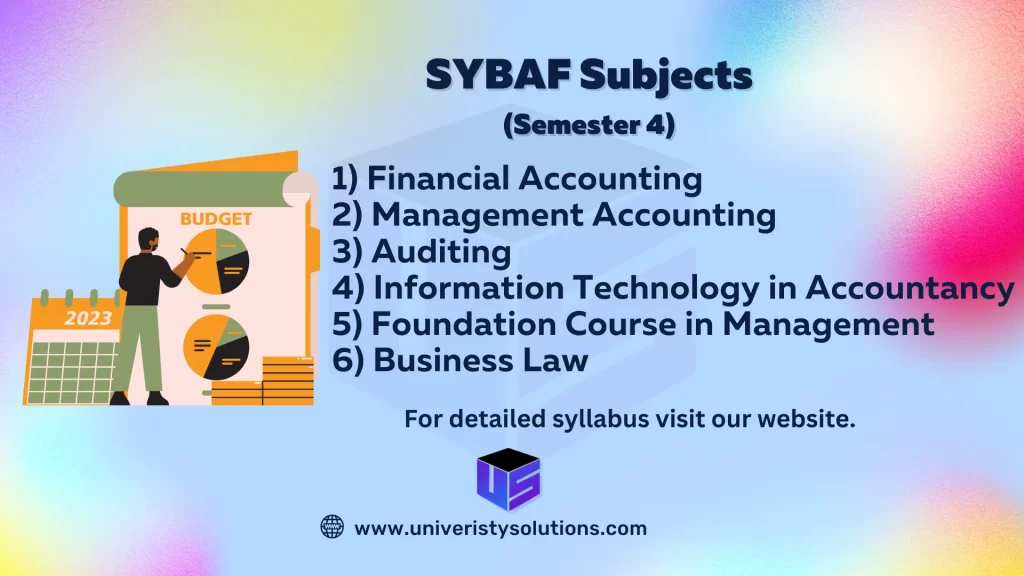
SYBAF Subjects
(Semester 3)
(SYBAF means Second year Bachelor of Accounting and Finance)
Following are the list of SYBAF Subjects (Semester III):
1) Financial Accounting
2) Cost Accounting
3) Auditing
4) Direct Tax
5) Macroeconomics
6) Business Law
7) Financial Market Operations
8) Information Technology in Accountancy – I
SYBAF Subjects (Chapters)
Financial Accounting
Chapter 1 – Partnership Final Accounts based on Adjustment of Admission or Retirement / Death of a Partner during the Year
Chapter 2 – Piecemeal Distribution of Cash
Chapter 3- Amalgamation of Firms
Chapter 4 – Conversion / Sale of a Partnership Firm into a Ltd. Company
Chapter 5 – Accounting of Transactions of Foreign Currency
Cost Accounting
Chapter 1 – Classification of Costs and Cost Sheet
Chapter 2 – Reconciliation of Cost and Financial Accounts
Chapter 3 – Contract Costing
Chapter 4 – Process Costing
Auditing
Chapter 1 – Vouching
Chapter 2 – Verification
Chapter 3 – Auditing Standards
Chapter 4 – Audit of Companies
Direct Tax
Chapter 1 – Definitions u/s – 2 & Basis of Charge and Exclusions from Total Income
Chapter 2 – Heads of Income
Chapter 3 – Deductions under Chapter VI – A
Chapter 4 – Computation of Total Income
Macroeconomics
Chapter 1 – Introduction to Macroeconomics
Chapter 2 – Money, Inflation and Monetary Policy
Chapter 3 – Constituents of Fiscal Policy
Chapter 4 – Open Economy : Theory and Issues of International Trade
Business Law
Chapter 1 – The Indian Partnership Act – 1932
Chapter 2 – Limited Liability Partnership Act – 2008
Chapter 3 – Factories Act – 1948
Information Technology in Accountancy – I
Chapter 1 – Introduction to Computers
Chapter 2 – Office Productivity Tools
Chapter 3 – Web
Chapter 4 – Introduction to Internet and other emerging technologies
Chapter 5 – Electronic Commerce
Financial Market Operations
Chapter 1 – An Overview of the Financial System
Chapter 2 – Financial Markets
Chapter 3 – Financial Instruments
Chapter 4 – Financial Services
Related Posts :
FYBAF Subjects
SYBAF Subjects
TYBAF Subjects
FYBAF Syllabus
SYBAF Syllabus
TYBAF Syllabus
SYBAF Subjects
(Semester 4)

Following are the list of SYBAF Subjects (Semester IV):
1) Financial Accounting
2) Management Accounting
3) Auditing
4) Information Technology in Accountancy – II
5) Foundation Course in Management
6) Business Law
7) Research Methodology in Accounting and Finance
SYBAF Semester 4 (Chapters)
Financial Accounting
Chapter 1 – Preparation of Final Accounts of Companies
Chapter 2 – Redemption of Preference Shares
Chapter 3 – Redemption of Debentures
Chapter 4 – Ascertainment and Treatment of Profit Prior to Incorporation
Chapter 5 – Foreign Branch
Management Accounting
Chapter 1 – Introduction to Management Accounting
Chapter 2 – Analysis and Interpretation of Accounts
Chapter 3 – Financial Statement Analysis : Ratio Analysis
Chapter 4 – Cash Flow Analysis
Chapter 5 – Working Capital Management
Auditing
Chapter 1 – Audit Report
Chapter 2 – Audit under Computerized Information System Environment
Chapter 3 – Professional Ethics
Chapter 4 – Investigation and Due Diligence
Research Methodology in Accounting and Finance
Chapter 1 – Introduction to Research
Chapter 2 – Research Design in Accounting and Finance
Chapter 3 – Data Collection and Processing
Chapter 4 – Interpretation and Report Writing
Information Technology in Accountancy – II
Chapter 1 – Business Process
Chapter 2 – Computerized Accounting System
Chapter 3 – Concept of MIS Reports in Computer Environment
Chapter 4 – IT and Auditing
Foundation Course in Management
Chapter 1 – Introduction to Basic Management Concepts
Chapter 2 – Planning
Chapter 3 – Organizing
Chapter 4 – Staffing
Chapter 5 – Directing and Controlling
Business Law
Chapter 1 – Definitions
Chapter 2 – Incorporation of Companies
Chapter 3 – Public Offer
Chapter 4 – Private Placement
Chapter 5 – Share Capital and Debentures
Tips to score good marks in SYBAF Exam
- Don’t wait until the last minute to start studying: begin early. You’ll have more time to learn the topic and solve questions, the earlier you start.
- Remain arranged: Plan a study schedule and stick to it. Take time to rest and refresh during breaks.
- Regularly review your notes: Regularly reviewing back your notes will help you keep the content in your memory.
- Practice, practice, practice: By working through sample problems and completing sample tests, you can identify your areas of weakness and become familiar with the exam’s format.
- Ask for assistance if you need it: If you’re having trouble with the subject, don’t be shy to ask for assistance. You can seek advice from your teacher, a classmate, or a tutor.
- Get a good night’s sleep: The night before the exam, be sure to get lots of rest. A mind that has got enough sleep is better prepared to memorize and recall information.
- Arrive early on exam day: Arrive early on the day of the exam to give yourself time to settle your worries and mentally prepare.
- Stay focused during the exam: Avoid being distracted during the exam by remaining focused. Take a deep breath and return your attention to the activity at hand if you realize that your mind is roaming.
- Don’t waste too much time on any one question: keep an eye on the time. If you start to struggle, leave it and return to it later.
- Review your exam after you’re done: After you’re finished, review your paper for a while. By doing this, you’ll be able to correct any mistakes you may have made and provide any answers you’re not sure about.
Pingback: TYBAF Subjects - Mumbai University | Semester 5 & 6 - University Solutions
Pingback: SYBAF Syllabus - Mumbai University | Semester 3 & 4 - University Solutions
Pingback: TYBAF Syllabus - Mumbai University | Semester 5 & 6 - University Solutions
Pingback: FYBAF Syllabus - Mumbai University | Semester 1 & 2 - University Solutions
Pingback: FYBAF Subjects - Mumbai University | Semester 1 & 2 - University Solutions
Pingback: Financial Management TYBAF Sem 6 Question Paper - University Solutions
Pingback: TYBAF Sem 6 Cost Accounting Question Paper | Free Download | Mumbai University - University Solutions
Pingback: TYBAF Sem 6 Economics Question Paper | Free Download | Mumbai University - University Solutions
Pingback: FYBAF books pdf Free download | Mumbai university - University Solutions
Pingback: TYBAF Sem 6 Financial Accounting Question Paper | Free download | Mumbai University - University Solutions